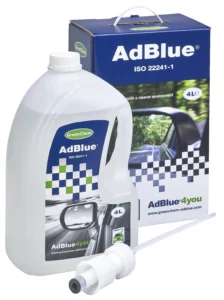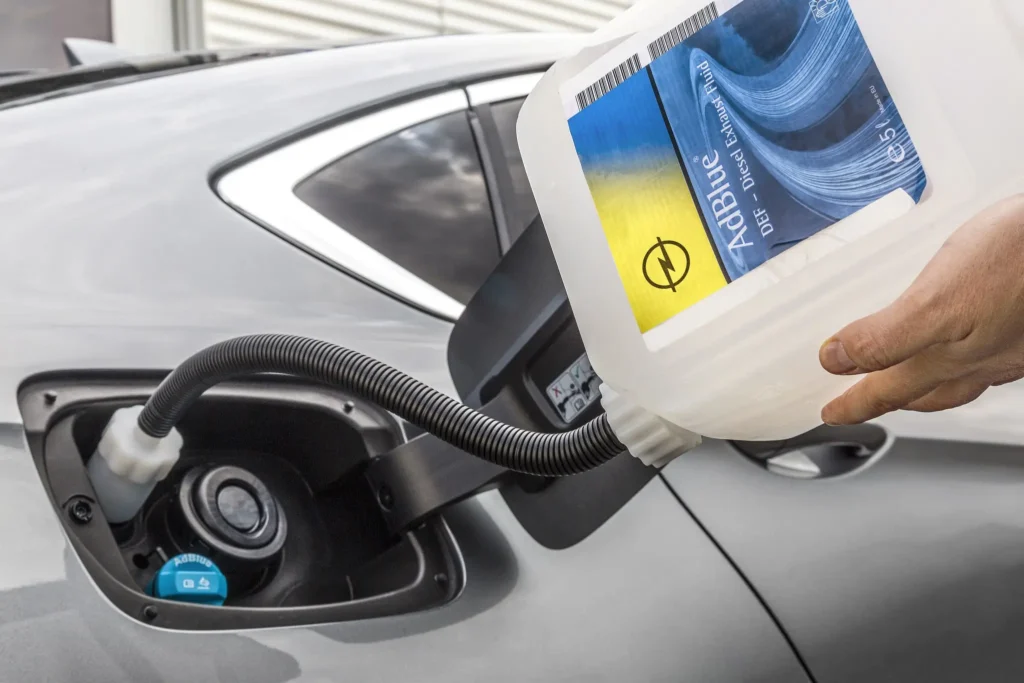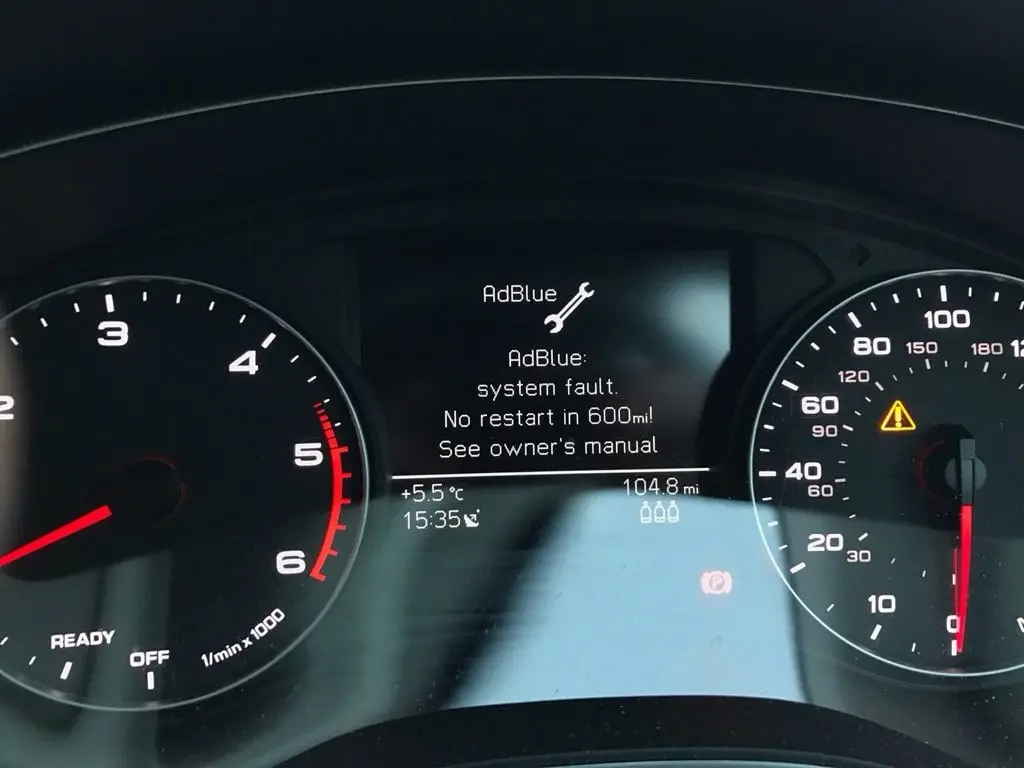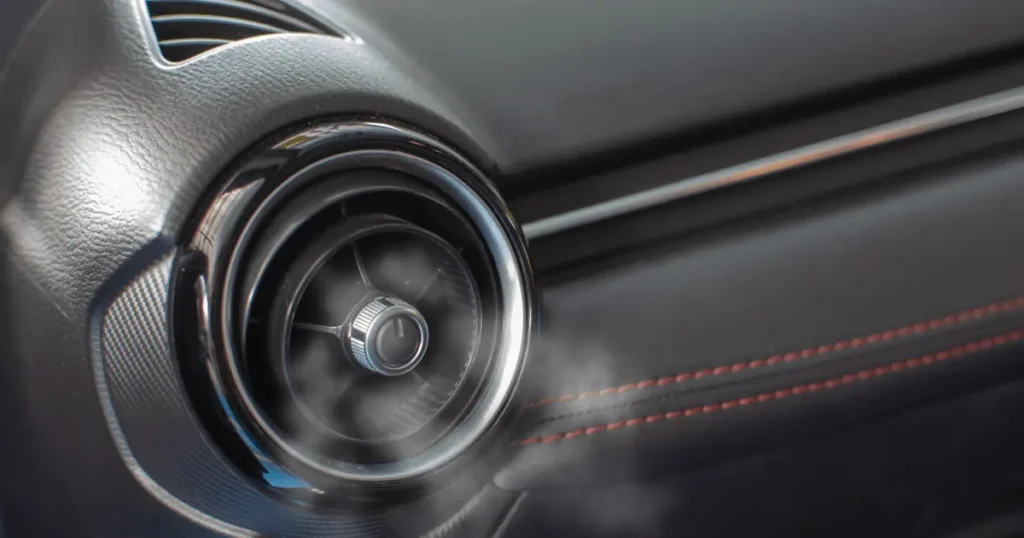You may have heard the term Adblue if you drive or service modern diesel vehicles. But what exactly is Adblue, why does it expire, and how to dispose of Adblue?
Adblue, also known commercially as diesel exhaust fluid (DEF), is a special solution injected into the exhaust to lower emissions. But when it degrades over time, proper disposal is critical to avoid environmental issues and costly damage.
This simple guide explains what Adblue is, why it goes bad, and the safest ways to dispose of any expired fluid.
What is Adblue and How to Dispose of Adblue?
Adblue is the branded name for a water-based solution used in most diesel vehicles built after 2010. It consists of highly purified water with 32.5% high-grade urea added.
The urea serves an important purpose – when sprayed into the hot exhaust stream, it breaks down ammonia which reacts with engine NOx emissions to convert them into basic nitrogen and water vapor.
This chemical reaction drops the vehicle’s tailpipe NOx levels, bringing emissions into compliance with clean air regulations. Adblue effectively cleans up diesel exhaust.
Most newer diesel cars, trucks, tractors, buses, and other vehicles have a dedicated Adblue tank that must be refilled as part of routine servicing. The Adblue tank is separate from the diesel fuel system.
Why Does Adblue Degrade and Expire?
Fresh Adblue has a relatively short shelf life of about 12 months before it starts decaying in quality and concentration.
Over time, the urea present in Adblue breaks down into ammonia, lowering the fluid’s effectiveness. Exposure to higher temperatures, either from ambient heat or the vehicle’s exhaust, accelerates the rate of urea decomposition.

Expired Adblue with decreased urea content can no longer adequately convert engine NOx emissions into harmless nitrogen as intended. Most diesel vehicles have sensors that detect Adblue quality and trigger dashboard warnings if it falls below optimal concentration.
To avoid any vehicle issues, Adblue past its prime needs to be disposed of responsibly. But even more importantly, proper disposal prevents hazardous environmental contamination.
Dangers of Improperly Disposing of Adblue
Allowing degraded, expired Adblue to run off or flow into the ground soil, plants, and waterways can cause grave ecological harm:
- The high ammonia content in decayed urea is highly toxic to vegetation and aquatic life. Runoff contaminates and throws off delicately balanced ecosystems.
- If contaminated fluid reaches rivers, lakes, or oceans, the sudden influx of urea and ammonia severely depletes oxygen levels. This endangers fish, underwater plant life, and other species as urea decomposes.
- Leached urea that penetrates fresh groundwater drinking wells poses a major health risk to both humans and livestock now exposed to the contamination.
- Soil quality and essential microbial activity are disrupted when excessive urea from improperly dumped Adblue decomposes in the earth. This damages the vital soil composition needed for plant growth.
Casually dumping leftover aging Adblue wherever is convenient can have dangerous broad-ranging impacts on environmental and human health. Properly identifying expired fluid and disposing of it through responsible means is crucial to prevent unnecessary ecological harm.
Safe Handling and Storage of Adblue
When using or storing Adblue, it’s wise to follow best practices to ensure safety and maximize shelf life:
- Wear impermeable gloves and eye protection when handling Adblue, which can irritate skin and eyes. Avoid contact with bare hands.
- Keep containers of Adblue stored in a cool, dry place out of direct sunlight. Temperatures below 86°F (30°C) are optimal for maintaining stability and preventing premature urea breakdown.
- Avoid transferring Adblue into non-approved containers, which provides an opportunity for contamination. Always use original bottles or urea-safe transfer equipment.
- Use only clear tubing rated for Adblue when dispensing from bulk storage to vehicles or equipment. The urea solution can be corrosive to some metals and plastics.
- Clean up any minor Adblue spills immediately with plenty of water. Allowing urea to dry on surfaces makes crystallization removal much more difficult.
- Check Adblue bottles and tanks for expiration dates periodically. Properly dispose of any degraded product no longer suitable for your vehicle’s emissions system.
Proper handling protects yourself, your vehicles, and the environment from issues.
Identify How to dispose of AdBlue.
Before disposal, it’s important to identify any Adblue requiring removal that is either expired or contaminated:
- Check expiration or best-by dates printed on the product packaging or label. Dispose of any Adlue that has surpassed its usable lifespan, generally 12 months.
- Inspect the fluid color and clarity. Adblue should appear clear and colorless when fresh. Cloudiness, floating particles, or other colors indicate contamination from improper storage or dispensing equipment. Dispose of any degraded batches.
- Use a specialized urea concentration hydrometer if available to accurately measure current urea content. Adblue falling outside the normal 32-33% urea purity range requires replacement and disposal.
- Pay attention to any Adblue-related warning lights illuminated on your vehicle’s dashboard. These include “Refill Additive”, “Poor Additive Quality”, or general Urea solution warnings. These alerts indicate the fluid life has expired. Further testing can confirm, but typically means it should be drained and disposed of responsibly.
Identifying and removing any contaminated or expired Adblue ensures your diesel vehicle’s emissions system performs optimally. Test quality if unsure, but always dispose of questionable fluid properly. Never ignore indicators of degradation.
Recommended Methods for Disposing of Adblue


Once you’ve identified Adblue that requires disposal, use these environmentally responsible methods:
Recycle Through Designated Programs
First, check locally for any Adblue recycling centers or events that handle responsible disposal. Some auto parts stores, dealerships, and community hazardous waste collection sites also accept old Adblue fluid for proper recycling or reclamation.
This is the best disposal how to dispose of the Adblue option since Adblue’s core components can be purified and reused. Recycling avoids wasting materials.
Absorb and Landfill
For small volumes of excess Adblue, the fluid can be solidified by mixing with absorbent materials until it forms a solid mass. Recommended materials include sawdust, cat litter, dirt, or general oil absorbents.
The resulting solidified urea can then be bagged and disposed of normally in your regular municipal landfill trash. This keeps Adblue’s problematic urea out of groundwater, vegetation, and soils that’s why it is important to know how to dispose of Adblue.
Dilute and Flush Down Interior Drains
As a last resort for very small amounts of Adblue, the fluid can be diluted 5 parts fresh water to 1 part Adblue, then flushed down an interior household drain only.
Only do this occasionally for minimal Adblue amounts, and only if connected to your community’s wastewater treatment system. The dilution substantially reduces urea levels to prevent disrupting biological processing at the municipal plant.
Check local wastewater and sanitary sewer regulations first, as some municipalities prohibit drain disposal of any chemicals like Adblue. When in doubt, avoid flushing down drains.
Avoid Dumping in Septic Systems
Never place any amount of Adblue down sinks, toilets, showers, or other drains connected to a household septic system. Even small amounts of urea will upset and contaminate the biological digestion in septic tanks. Repairing or replacing a fouled septic system due to improper Adblue disposal can cost thousands.
In summary, always dispose of old Adblue through designated recycling programs or hazardous waste collections whenever possible. If only small amounts remain, solidifying or diluting then flushing avoids environmental impact. But keep all Adblue completely out of septic systems.
Recycling Empty Adblue Containers
Before disposing of empty Adblue jugs, bottles, or buckets, consider recycling:
- Plastic Adblue containers are typically manufactured from HDPE, polyethylene, or polypropylene – all common recyclable plastics. Check for a number 2 or 5 resin identification code.
- Thoroughly triple rinse containers with fresh water after emptying them to remove any remaining traces of Adblue residue.
- Replace lids, caps, and bungs to avoid spill potential, then take intact containers to your local recycling center if they accept plastics.
- Many auto parts stores, dealerships, and community recycling events also accept rinsed Adblue containers. Call ahead to confirm.
Recycling emptied containers is simple and keeps more waste out of landfills. But never place Adblue containers with residual fluid still inside into recycling – always triple rinse thoroughly after emptying. Many auto parts stores, dealerships, and community recycling events also accept rinsed Adblue containers. Could you call ahead to confirm? This article How to Recycle empty Adblue containers covers more great tips on recycling empty DEF bottles and jugs.
Avoiding Excess Leftover Adblue
Smart planning when purchasing Adblue helps minimize leftovers needing eventual disposal:
- Only buy enough Adblue that you expect to use within the product’s 6-12 month shelf life. This avoids having aging surplus fluid around.
- When refilling Adblue tanks or dispensing into smaller bottles, use the oldest inventory first to keep fresher products on hand longer. Rotate your stock.
- Consider purchasing Adblue shelf life extenders that help stabilize urea longer by slowing decomposition.
- If your diesel vehicle has both an in-service tank and a larger reserve tank for Adblue, draw from the active tank first before tapping into the reserve supply. This reduces leftovers.
- Align fluid change intervals so new Adblue purchases coincide with required tank refills.
Thinking ahead reduces surplus fluid buildup needing eventual disposal. Use the oldest Adblue first, and size purchases based on actual usage. Similarly, addressing vehicle issues early on, such as a turbo leaking oil into the intercooler, minimizes more costly repairs down the road.


Warning Signs Your Vehicle Requires Adblue Replacement
Modern diesel vehicles alert drivers when Adblue needs to be drained and replaced before major issues can occur:
- Sensor warning lights – Lights labeled “Refill Additive”, “Poor Additive Quality”, or plain “Urea” warnings indicate old Adblue needs to be flushed and refilled.
- Reduced power – To encourage fixing degraded Adblue, some vehicles intentionally enter a power limitation limp mode. Acceleration and speed are hampered until the fluid is renewed.
- No start – In worst-case scenarios, severely contaminated or expired Adblue may prevent the vehicle from starting completely. This forces the issue to avoid emissions compliance violations.
- Failed emissions tests – Emissions checks revealing higher NOx levels likely mean the old Adblue is no longer adequately converting the gases as it should.
Address Adblue ages out warnings without delay to get back on the road. Always dispose of the drained expired fluid responsibly using the steps outlined in the How to Dispose of Adblue guide. Diagnosing issues like car jerks while driving at constant speed promptly also keeps your vehicle running smoothly.
Frequently Asked Questions
Let’s review some frequently asked questions on proper Adblue disposal and recycling:
Is it safe to pour Adblue down the drain?
No, never pour concentrated Adblue down interior household drains or exterior storm drains. The high urea content can disrupt wastewater treatment systems and harm the environment. Even after diluting, limit flushing small amounts occasionally into sanitary sewer only.
How do you neutralize old Adblue?
To solidify excess liquid Adblue for landfill disposal, mix it with an equal amount of water first. Then stir in cat litter, dirt, or sawdust until it forms a solid clump. This prevents the problematic urea from leaching into groundwater or soils.
Will flushing Adblue damage my septic system?
Yes, putting any amount of Adblue down sinks or drains connected to a household septic tank is risky. The urea will upset the biological digestion, which requires expensive repairs. Always keep Adblue completely out of septic systems.
Is expired Adblue dangerous?
While not directly hazardous, improper disposal of degraded Adblue allows environmental contamination, which poisons ecosystems, plants, and drinking water through nitrogen overload, proper disposal prevents broad impacts.
Understanding correct usage, storage, and disposal best practices allows safe Adblue handling. Follow this how-to dispose of AdBlue guide to avoid issues.
Conclusion
Adblue or DEF helps modern diesel vehicles meet stringent emissions regulations. But like any consumable, it gradually degrades with age and use, eventually requiring responsible removal.
Carelessly dumping old Adblue can profoundly damage the environment, public infrastructure, and private septic systems. This guide covers safe handling, identifying expired solutions, and the proper methods for disposing of Adblue without leading to larger issues down the road.
The key takeaways on proper Adblue disposal include:
- Checking fluid expiration dates and monitoring vehicle alerts indicating when replacement is needed
- Inspecting Adblue for signs of contamination or concentration degradation
- Avoiding dumping down household or septic drains – use designated recycling or solidification disposal methods
- Diluting then flushing minimal amounts to sanitary sewers only, never septic systems
- Recycling emptied Adblue containers after thoroughly rinsing out all traces
Following these tips allows responsible use and how to dispose of adblue throughout its lifecycle. Protect your vehicle, the environment, and your property by disposing of old diesel exhaust fluid appropriately. Like fixing stone chips How to hide stone chips on a Car, handling Adblue properly prevents bigger issues Hope you will now know how to dispose of Adblue.



